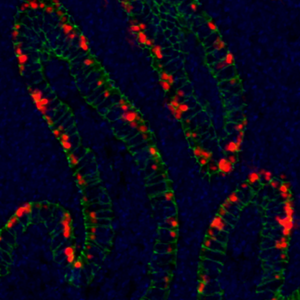Microbiology
About

Chlamydia (red) replicating in epithelial cells (green) of the murine female genital tract. Photo courtesy of Isabelle Derré
We investigate the fundamental biology of bacteria, viruses, and eukaryotic pathogens, and how these organisms interact with their hosts and each other. While many host-microbe interactions are pathogenic, other interactions such as those with commensal microbiota, are host-protective. Microbes also serve as important model systems that help us understand basic cellular functions that are relevant to human disease. Such functions include how genes are regulated, how nucleic acids replicate, are repaired and persist in cells, how proteins and RNAs are synthesized and processed, and how they traffic. Our mechanistic research studies lead to translational approaches, including drug discovery and vaccine development, to identify new therapeutic modalities for both infectious and other diseases, as well as prebiotic/probiotic treatments.
Research questions addressed in our Microbiology labs include:
- How do microbes (viruses, bacteria, and parasites) organize and regulate their genetic material?
- How do they persist to cause chronic disease?
- What mechanisms do they use to successfully replicate and survive in host cells, tissues, and organisms, and what host functions are specifically targeted during productive infection?
- How do specialized cell types respond to infection?
- How do microbes respond to host immune pressure and surveillance?
- How is infection affected by the microbiota or coinfecting microbes?
- How does resistance to antimicrobial drugs occur, and how can this be overcome?
We are a highly collaborative group of scientists. The questions we ask are enriched by dynamic interactions with the Immunology and Cancer Biology facets of the Department of MIC, and many other labs in the School of Medicine and beyond. Research opportunities in the Department are complemented by journal clubs, retreats and seminar series, throughout the School of Medicine. NIH-sponsored training programs in Infectious Diseases, Global Biothreats, Neuroimmunology and Immunology provide support for selected graduate students. There are outstanding core facilities to enable this work and exceptional infrastructure for BSL-2 and BSL-3 research, including extensive vivarium facilities.
Faculty

Agaisse, Herve
Genetic approaches, cellular and molecular biology of intracellular pathogen infection

Engel, Daniel A.
Drug Discovery and Molecular Biology of Pathogenic RNA viruses: Ebola, SARS-CoV-2, Influenza and Zika

Ewald, Sarah E
Innate immunity, chronic disease, host-parasite interactions, Toxoplasma gondii, proteomics

Hammarskjold, Marie-Louise
Post Transcriptional Gene Regulation and the Molecular Biology of Human Retroviruses

Rekosh, David M.
Human Immunodeficiency Virus Gene Expression; Human Endogenous Viruses; SARS-CoV-2 Protein Trafficking; Post-transcriptional Gene Regulation

Rutkowski, Melanie
Influence of commensal microbes on immune homeostasis, anti-tumor immunity, and metastasis

Spencer, Brady
Gram-positive pathogenesis; type VII secretion; impact of secreted effectors on host-pathogen interactions and immune responses

Tak, Uday
Prokaryotic immune systems, bacteriophage virology, programmed cell death, pore-forming proteins, evolution of immunity, protein engineering

Zegarra-Ruiz, Daniel Fernando
Unraveling the role of host microbe interactions in autoimmune diseases








